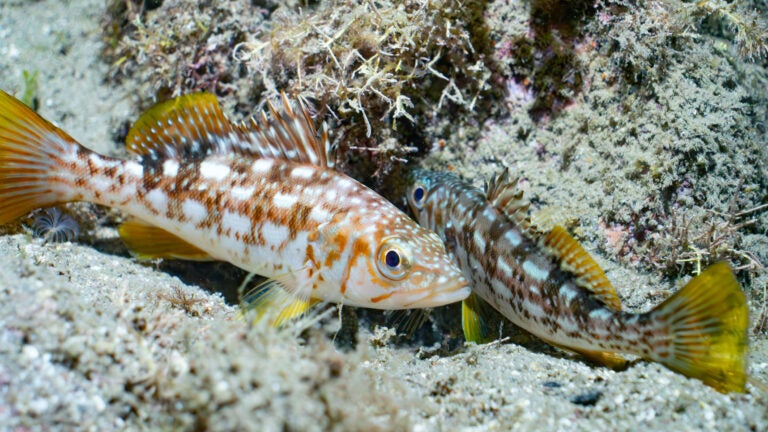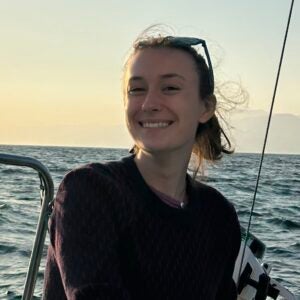
Kelp bass in Big Fisherman Cove, where the Wrigley Marine Science Center is located (Nick Neumann/USC Wrigley Institute)
Diving into the world of kelp bass
When you first learn to scuba dive, they tell you how colors disappear as you descend deeper underwater. Red fades at around 15 feet, then oranges and yellows—so characteristic of a sunset—vanish by 30. By 70 feet down, the green of treetops becomes a distant memory, leaving only the deep indigos and purples that the sea is known for. Yet, no matter how many dives I go on or how deep I go, I’ve never truly noticed this to be true.
What I do notice is sound.
When you first start scuba diving, everything is quiet. There are no overheard conversations, no city hustle and bustle, and not even the sound of the wind. It is completely silent, except for the rhythmic sound of your respirator and the bubbles it creates, constantly reminding you that this activity is entirely unnatural for a human.

The more I’ve scuba dived, the more I’ve realized two truths. Firstly, the ocean is far from silent, and secondly, fish are surprisingly judgmental.
As an undergraduate at USC, my classes and experiences have shaped my interests and helped mold me into the person I was always meant to be. During the spring semester, as an enthusiastic environmental studies major, I enrolled in a fisheries and sustainability class, eager to learn more about protecting the ocean I’ve always loved. I explored various fishing methods, how sustainable aquaculture can be implemented, and, sadly, the numerous problems we are currently facing that threaten not only the ocean ecosystem but also our food supply.
I began to question how we can best protect the fish we rely on most—those that are heavily targeted by society for economic benefit—and how our current protection measures hold up in the real world. In discussions with a USC professor, we devised a plan to address these questions through a summer research project focused on the local kelp bass, one of the most popular sport fish in California. When I was chosen to receive a Wrigley Institute Environmental Summer Award for support, I was eager to dive–quite literally–into the process of finding answers to my questions.
I am incredibly privileged to conduct my research at the Wrigley Marine Science Center (WMSC) on Catalina Island. The institute is situated in a pristine turquoise bay that is part of a marine protected area (MPA), where fishing, removal, or alteration of any kind is prohibited, providing an excellent control group. My study sites extend to varying distances outside the MPA, where I survey kelp bass populations to make comparisons and assess the effectiveness of the existing protection measures in preserving the health of the population.
Kelp bass are incredibly curious, and each time I dive to research them, I always find them staring back at me. Whether I’m laying out a transect, writing notes on my slate, or simply taking a moment to rest, there are always fish observing my mask color, swimming style, or even just the fact that I’m interrupting their day. Their hazel eyes, filled with wonder, curiosity, and a healthy helping of judgment, never fail to make me chuckle as I feel like the least interesting thing in the ocean. Despite the sun shining through the kelp forest, the garibaldi grunting and fighting, or a decorator crab picking algae off a rock to adorn its shell, the kelp bass can’t seem to take their eyes off me.
At the end of this summer, I learned that we are doing well at WMSC. The MPA is effectively set up to protect juvenile populations, providing them with an excellent variety of habitat and resources to sustain a strong population. This success is promising, but it only deepens my curiosity about other economically important species and the metrics we can use to better protect all life in the oceans.
This experience has steered me toward a path of holistic protection and has made me consider how we can integrate legislation and science for the ultimate benefit of nature. It has become essential for me to understand how to bring all factors of decision-making to the table simultaneously to best promote fishery health and global well-being. Billions of people rely on fish as a primary source of protein, millions depend on it for their income, and all of us rely on ocean health for our daily lives. This project has opened my eyes not only to protection methods but also to the interconnected gears and cogs within the system that work together to address such a widespread global issue. I aspire to work towards this goal and advocate for the health of all fishery stocks, even those that judge me in the cacophony of the ocean.